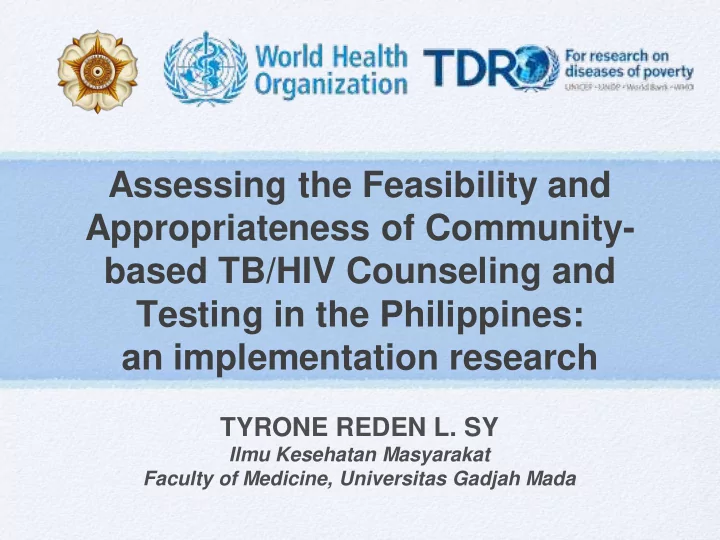

Assessing the Feasibility and Appropriateness of Community- based TB/HIV Counseling and Testing in the Philippines: an implementation research TYRONE REDEN L. SY Ilmu Kesehatan Masyarakat Faculty of Medicine, Universitas Gadjah Mada
Background • TB-HIV co-infection is considered as a ‘ deadly human syndemic ’ globally. • HIV infection is considered the strongest known risk factor for TB. • TB incidence rate is significantly correlated with high HIV prevalence rates. Source: Kwan & Ernst, 2011
Philippines: 322 TB cases per 100,000 including HIV+TB (WHO, 2016)
• Incidence of newly diagnosed HIV case per day increased: – 1 per day in 2008 – 9 per day in 2012 – 17 per day in 2014 – 26 per day in 2016 • Primary MOT: Males having sex with males (81%) Source: HIV/AIDS ART Registry, June 2016
TB+HIV Situation in the Philippines • Incidence: 4.3 per 100,000 population • TB patients with known HIV status: 13% • HIV-positive people screened for TB: 5,995 (99.73%) Source: WHO Philippines TB Country Profile, 2016, 2014
Challenges to TB/HIV Prevention and Control in the Philippines • Only 8,263 (57%) of the target 15,000 patients have undergone HIV testing. • Limited access to HIV services that is centralized in urban areas and inadequate logistics. • Fast turnover of staff especially medical technologists (laboratory technicians). • Trained staff do TB/HIV counseling and testing are already overburdened. Source: Updated 2010 – 2016 Philippine Plan of Action to Control Tuberculosis, DOH Philippines
Possible Solution: CHWs • CHWs have been tapped as a source of additional manpower to provide TB/HIV care: – South Africa: TB/HIV/PMTCT (Uwimana et al, 2012) – India: oral rapid HIV testing and counseling (International HIV/AIDS Alliance, MAMTA) – Sub-Saharan Africa: CHWs contribute to quality and uptake of HIV services (Brunie et al, 2014) • In 2010: 173,369 active barangay health workers (34.67 per 20,000 population) in the Philippines.
Can we engage CHWs in the Philippines? • CHWs have already been trained on: – Tuberculosis case management, sputum collection, smearing in Mindanao, southern Philippines. (Guzman, 2009) – ICT tests for malaria testing in Palawan. (Bell et al, 2001) • Scant evidence on the feasibility and appropriateness of delegating TB/HIV counseling and testing to CHWs.
Problem Statement • Bottlenecks in the access of integrated counseling and testing of TB/HIV patients exist. • Contributing factors: scarcity of trained personnel, inequitable distribution, and overburden of trained health professionals to do counseling and testing. • One strategy: delegate TB/HIV counseling and testing to CHWs (already done in India, Africa). • Need to assess because there are contextual differences between Philippines, India and Africa.
General Objective • To evaluate the feasibility and perceived appropriateness of delegating TB-HIV testing and counseling to community health workers in select primary healthcare centers of the Philippines.
Specific Objectives 1. To describe and to compare the perceived appropriateness of delegating TB-HIV testing and counseling to CHWs, between community stakeholders, civil societies, program managers, and TB and HIV patients;
Specific Objectives 2. To describe the existing implementation contexts in select primary health care centers including the local government units where these facilities are nested (e.g. needs of TB and HIV patients, existing programs or policies on TB-HIV prevention and control, environmental, economic and cultural factors);
Specific Objectives 3. To identify technical, financial and infrastructural needs in order to provide TB-HIV counseling and testing at the primary health care;
Specific Objectives 4. To describe the characteristics of CHWs in select primary health centers in terms of their background, knowledge/training, skills, existing workload and responsibilities, as well as the characteristics (technical, financial and infrastructural capacities) of select primary health centers and local government units in supporting TB-HIV counseling and testing services; and
Specific Objectives 5. To compare the identified needs and implementation contexts vis-à-vis existing capacity of CHWs and characteristics of primary health care centers/local government units in supporting the delegation of TB-HIV counseling and testing to CHWs.
METHODOLOGY
Design: Sequential Explanatory Mixed Methods
Data Collection • Review of secondary data (e.g. policy documents, TB and HIV rosters, trainings on TB/HIV care received) • Surveys among TB/HIV patients (n=350 TB/384 HIV patients) and CHWs (e.g. perceived appropriateness, KAPs about TB/HIV) • Assessment of CHWs ’ workload and counseling skills • Facility assessment using WHO-Service Availability and Readiness Assessment questionnaire • Focus group discussions and/or key informant interviews among national and local health program managers, other staff of the primary healthcare centers, and representatives of civil societies.
Research Setting – San Jose del Monte, Bulacan (Previously low priority area in 2012, became high priority area in 2015) – Batangas City, Batangas (medium priority area)
Data Analysis • Reliability Analysis: Cronbach ’ s Alpha, Inter-Item Total Correlation • Construct Validity (for likert scales): Factor Analysis (with Varimax/Direct Oblimin Rotation) • Demographics, WHO- SARA questionnaire, trainings received by CHWs: Descriptive Statistics and Frequency Analysis
Data Analysis • Measures of Appropriateness: Mean, Median • Predictors of Appropriateness: Multiple linear regression, logistic regression • Qualitative Data Analysis: Structured Content Analysis (Graneheim & Lundham, 2004)
Research Ethics Principles 1. Administration of Informed Consent Forms 2. Assurance of Anonymity, Confidentiality 3. Compensation in the form of information brochures, travel reimbursements, food and snacks, small tokens (i.e. hand sanitizer, soap) 4. Responsibilities of research team in case participants get harmed (physical, psychological) 5. Assurance that they will be given explanation of results of the study if they so wish 6. Contact details of the research team and the approving research ethics board
Maraming salamat po! Terima kasih! tlsy@up.edu.ph +62821-344-14604
Recommend
More recommend